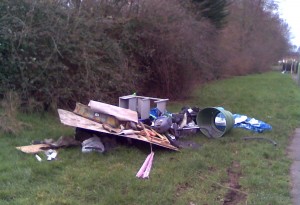’ve started doing a lot more walking locally recently and have been becoming increasingly frustrated with the volume of litter, particularly in a nearby housing estate that I cut through to get to the local town centre. But on reading briefly into the issues, I am struggling to identify a solution to combat the problems associated with littering, fly tipping, dog waste, chewing gum etc. that might actually work.
All sorts of ideas and images float through my mind. Campaigns like Keep Britain Tidy. The knowledge being spread that there is ‘No dog poo fairy’. Royal Mail red rubber bands being returned. Gum removal in town centres. What happened to refunds on bottles?
Education is obviously one solution. Children can be taught acceptable community behaviour by parents and schools. But the children are also influenced by parents and others who may not personally have such acceptable behaviour and themselves contribute to littering, be it an older teenage brother dropping a drinks can, or an older neighbour hoofing a mattress over the fence into local green space. Learnt behaviour can be difficult to shift.
Do well maintained landscapes with regularly mown grass, clipped hedges and neatly pruned vegetation help to create enough of a sense of pride in local areas so as to ‘stop the drop’? Do we want everywhere looking manicured? Would it work? And with what effect on ecology?
The ‘no littering’ mantra rolled out in manicured Singapore is renowned. The import, sale and possession of chewing gum is banned there due to the high cost and difficulty in removing stuck gum from public space and property. Some years ago Terra Firma tendered, sadly unsuccessfully, for an urban design project aimed at giving a much needed facelift to a Hampshire town centre. Force of public feeling led to the abandonment of the chosen proposals and the purchase of a special chewing gum removal machine instead.
I read that litter costs local authorities £500million a year to clean up. On a recent walk I spoke to a local resident who told me she had reported the same litter problem to the local authority on numerous occasions to no avail. She was, when I spoke to her, taking matters into her own hands and had created two heaps of rubbish, cleared from the undergrowth and grass areas to the grass areas around her housing block. To me it looked far worse mounded up. She speculated with me about whether, if she rang again, the local authority would collect it now. We both wait to see.

If we all persistently reported litter problems through websites such as ‘fixmystreet’ and local authorities were forced through sheer volume of complaints to clear up, would we simply be driving council tax costs higher to cover the fix? Or would they start to consider alternative campaigns of action in order to reduce clearing up costs in these times of financial hardship?
One action possible is fining. Is this the solution? If you are caught littering by a local authority warden they can give you an on the spot fine of up between £50 and £80. If the police catch you littering and you are charged, it can be up to £2,500. I suppose the problem is catching you. In some countries points can be added to a driving licence for throwing litter from a vehicle. Does this include apple cores? I quite like the quirky crop on the roadside in the autumn.
Is community action the solution? Should we tackle our neighbourhoods ourselves? Behind my house is a large, unmanaged but protected, oak woodland, with many paths used by the local community as an unofficial public rights of way. Every now and again I take a black sack through the wood and clear up litter; the odd can here and there, sweet wrappers, plastic. More items replace those picked up over time and I begin to wonder if, by doing this seemingly good deed, that I am perpetuating the problem. Do others think that it’s fine to drop litter because it always gets cleared up in the end? Should I stop?
I have reported two dumped cars locally. One, burnt out on the edge of a local public open space, was moved in the end (luckily not before my husband successfully extracted a rear light to mend his own car). The second, reported to Hampshire County Council around 10 years ago, had been abandoned on the side of a local bridleway. It still sits there and rots further each year. I am reliably informed it was a Mini Metro. If it rots further I may be able to start putting pieces in my black sack.